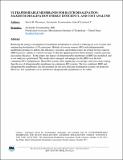ULTRAPERMEABLE MEMBRANES FOR BATCH DESALINATION: MAXIMUM DESALINATION ENERGY EFFICIENCY, AND COST ANALYSIS
Author(s)
Warsinger, David Elan Martin; Swaminathan, Jaichander; Lienhard, John H.
DownloadUltrapermeable membranes for batch desalination- energy efficiency cost Warsinger IDA2017 b.pdf (393.0Kb)
OPEN_ACCESS_POLICY
Open Access Policy
Creative Commons Attribution-Noncommercial-Share Alike
Terms of use
Metadata
Show full item recordAbstract
Reducing the energy consumption of membrane desalination is critical to reducing its cost of water and minimizing desalination’s CO₂ emissions. Hybrids of reverse osmosis (RO) with ul
trapermeable membranes promise to address the efficiency, rejection, and fouling issues. In a batch reverse osmosis (BRO) process, salinity is varied over time so that the applied pressure better matches osmotic pressure, increasing efficiency. In this paper, the impact of ultrapermeable membranes in BRO are modelled, and a cost analysis is performed. The results show energetic advantages for the BRO over the best continuous RO configurations. Batch RO systems offer significant cost savings, and saves more energy than the use of ultrapermeable membranes in continuous RO systems. The two combined, BRO and
ultrapermeable membranes, has the potential for the most efficient desalination systems yet proposed. However, low membrane cost is needed for ultrapermeable membranes to be viable.
Date issued
2017-10Department
Massachusetts Institute of Technology. Department of Mechanical EngineeringJournal
The International Desalination Association World Congress
Citation
Warsinger, David M. et al. "ULTRAPERMEABLE MEMBRANES FOR BATCH DESALINATION: MAXIMUM DESALINATION ENERGY EFFICIENCY, AND COST ANALYSIS." The International Desalination Association World Congress, October 15-20, 2017, Sao Paulo, Brazil, International Desalination Association World Congress, October 2017
Version: Author's final manuscript